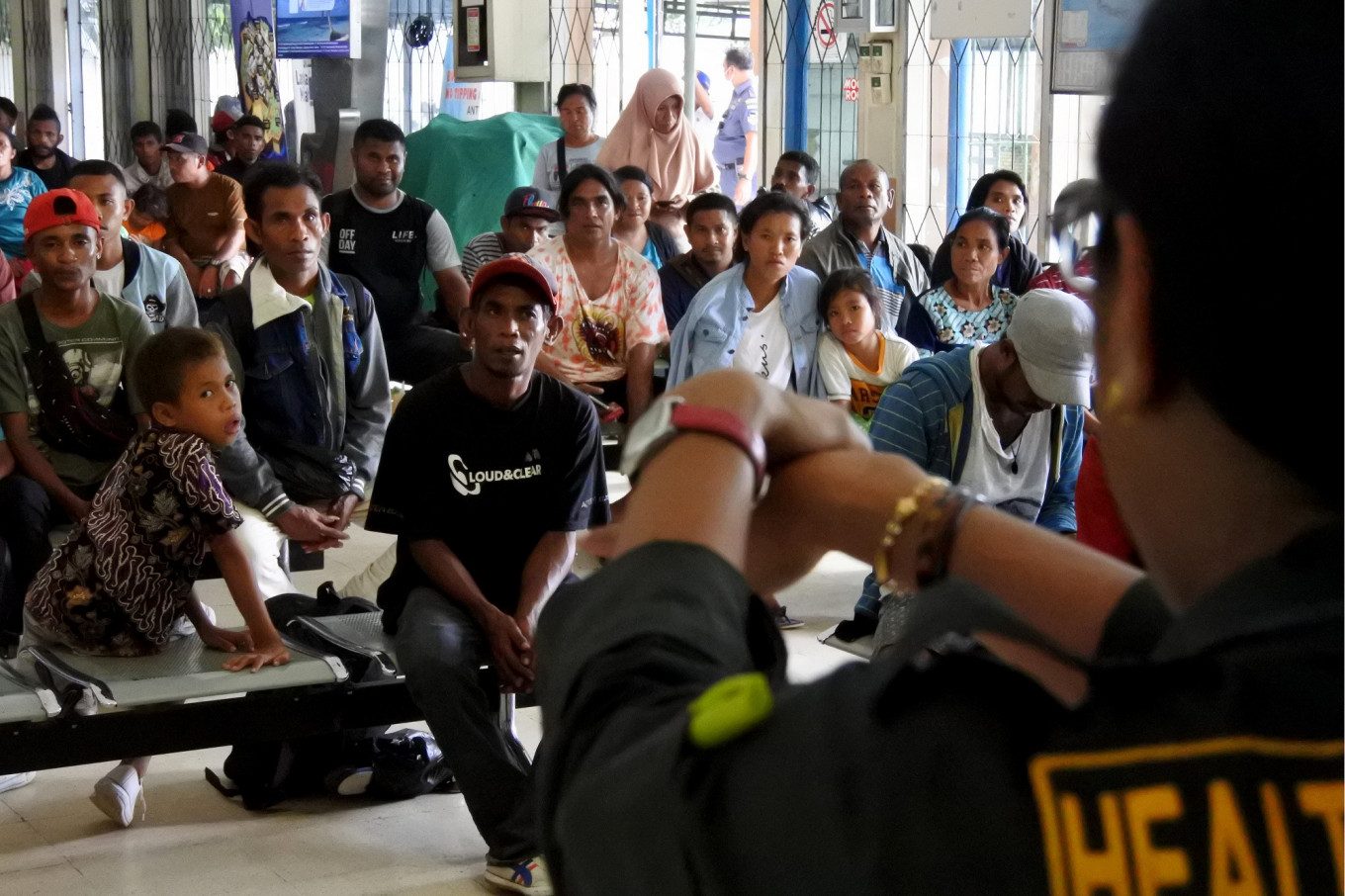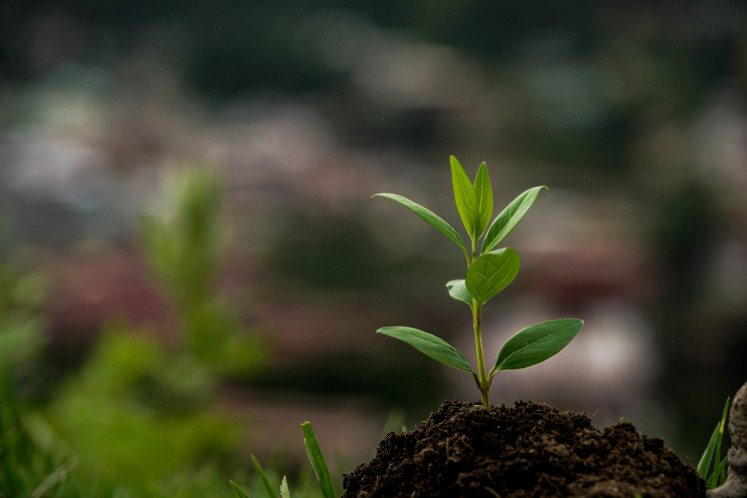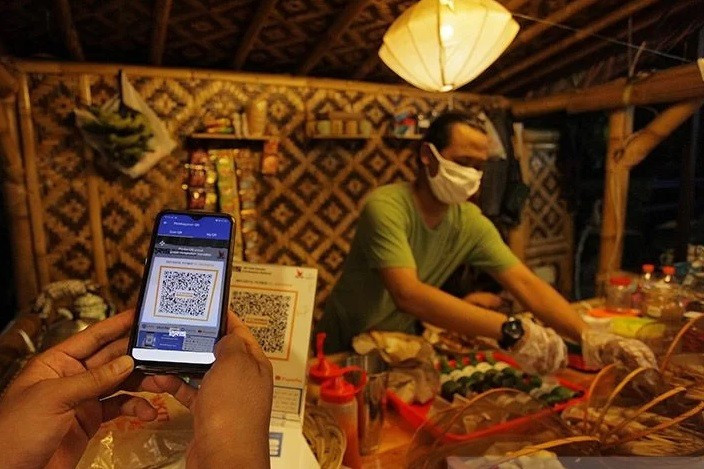Popular Reads
Top Results
Can't find what you're looking for?
View all search resultsPopular Reads
Top Results
Can't find what you're looking for?
View all search resultsHandwashing and improved hygiene a silver lining in the dark cloud of COVID-19
While it’s still too soon to declare victory, public health experts and policy makers should look to capitalize on the significant shift in handwashing habits, from the most densely populated cities to remote villages.
Change text size
Gift Premium Articles
to Anyone
 An official from the port health authority demonstrates proper handwashing procedure to passengers waiting at Tenau Port in Kupang, East Nusa Tenggara on March 3, 2020. Kupang Port Health Authority has been distributing information to passengers on how to prevent the spread of COVID-19. (Antara/Kornelis Kaha)
An official from the port health authority demonstrates proper handwashing procedure to passengers waiting at Tenau Port in Kupang, East Nusa Tenggara on March 3, 2020. Kupang Port Health Authority has been distributing information to passengers on how to prevent the spread of COVID-19. (Antara/Kornelis Kaha)
I
f you are looking for a silver lining in these challenging times let it be this: the sharp rise in handwashing with soap. This is especially true among populations where diarrhea and upper respiratory infections are common in children under the age of 2. This change in behavior has the potential to significantly reduce the overall rate of stunting over the next 24 months.
The Abdul Latif Jameel Poverty Action Lab (J-PAL), a global poverty reduction research center, noted in its most recent online survey of health knowledge and practices in Indonesia that sanitation use had expanded considerably. According to the J-PAL survey, increased handwashing with soap remains the most commonly implemented practice, and 72 percent of survey respondents reported a change in at least one sanitation activity. In Labuan Bajo, East Nusa Tenggara, reported instances of diarrhea have dropped from 79 cases in April 2019 to 23 in April 2020. There were 97 reported cases in May 2019 and four so far in May 2020.
The pandemic is indeed a once-in-a-generation story. But it is also a once-in-a-generation chance to leverage existing momentum. Instead of allowing ourselves to return to business as usual, we should seize this opportunity to slash stunting rates once and for all.
Now more than ever, evidence-based, proven programs that reach low-income families with hygiene, first 1,000 days and stunting education are a critical investment in the health and well-being of mothers and their children.
While it’s still too soon to declare victory, public health experts and policy makers should look to capitalize on the significant shift in handwashing habits, from the most densely populated cities to remote villages.
And it is not just incidents of diarrhea that will be reduced. More masks mean less tuberculosis and fewer cases of upper respiratory infections. Meanwhile, village funds have been rerouted to distribute soap and produce communication tools such as banners to promote handwashing, further galvanizing efforts and bolstering the impact of the heightened attention to sanitation.
Understanding that we are still in the midst of a coronavirus outbreak, it is possible there has been an underreporting of diarrhea, upper respiratory infections, worms and tuberculosis across Indonesia. But if we accept this argument, then we must also accept the same possibility for the J-PAL study of people washing their hands.
Stunting, or low height for age, is caused by insufficient nutrient intake, poor hygiene and frequent infections. There are currently more than 9 million children in Indonesia who are stunted; 54 percent of the workforce, or some 136 million adults, are stunted. Indonesia is among the five countries with the highest number of stunting cases in the world.
Indonesia is a G20 nation and it has the largest economy in Southeast Asia. It is also home to provinces like East Nusa Tenggara, where the stunting rate is a staggering 43 percent, according to a report distributed by the Ministry of Health. This powerhouse economy has been built on the backs of people who are 10 times more prone to illness than their regional counterparts, with that same stunted workforce working with 10 fewer IQ points.
The World Bank, meanwhile, estimates that every dollar invested in early childhood education yields roughly US$8, while a dollar invested in maternal and newborn health interventions yields $16. Every dollar Indonesia invests in stunting interventions can generate $48, according to a World Bank model. That is a public policy investment that would be a clear public good.
For the last two years the 1000 Days Fund, an NGO focused on addressing the issue of stunting in Indonesia, has worked hand in hand with kader (frontline village health volunteers ), bidan (midwives) and community health centers (Puskesmas) on more than 25 islands across Indonesia, installing colorful, life-sized, easy-to-understand height charts in the homes of pregnant women and women with children under 2 to help fight stunting.
The charts are filled with relevant and applicable information related to the first 1,000 days of life, but none is as important as washing your hands with soap. Why start with height charts? Because Indonesia needs a simple, cost-effective and scalable solution to stunting. Another simple, cost-effective and scalable solution to stunting? Soap.
Back in March, before the pandemic reached Flores, 1000 Days Fund reordered as an organization and started to think hard about how it could save lives. With the help of generous donors, 1000 Days Fund quickly procured as much soap as humanly possible to distribute to villages in an effort to keep the local hospitals from being overwhelmed. This effort started with an initial distribution of 2 tons of soap in roughly 27 villages.
More than huge loans from the World Bank or evidence-based policy that costs millions to get in front of the right policy makers, the last 90 days will have a fundamental impact on the way we look at hygiene and the habits we form and pass on to our children.
It is important to recognize that we cannot afford to lose the progress that has been made over these last few months. Governments and NGOs need to continue reinforcing the message of hygiene long after the pandemic has ended so this silver lining can be mined for all its health benefits.
***
Co-founder of the 1000 Days Fund, an NGO focused on stunting and access to antenatal care.









